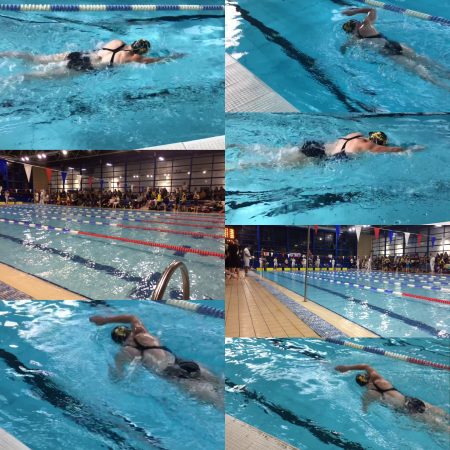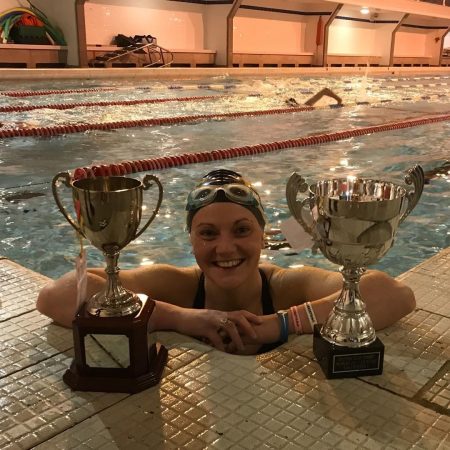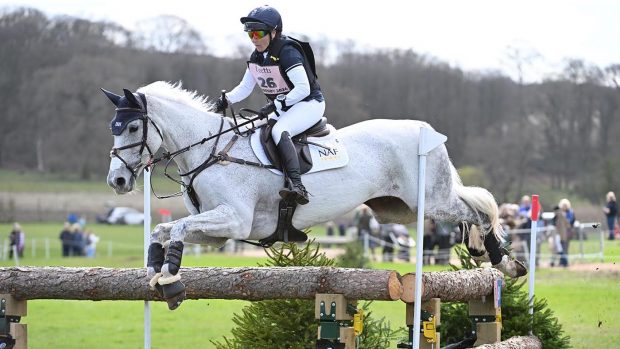Planning is key for me, not only because I’m slightly OCD when it comes to knowing exactly what I am doing each day and having a structured week, but I also have to take into account having someone to help me from time to time, especially at competitions.
I find that in order to get the most out of my days, weeks and month, I have to be extremely organised, making sure I plan around my competitions and factor in physio, strength and conditioning, hospital appointments, lessons, and most importantly, some rest to allow my body to peak at the right time.
I’ll be completely honest, I struggle to give myself enough rest time in my weeks. I find that keeping myself busy is sometimes a coping mechanism to forget about any frustrations and any challenges I am facing. The more I do, the more I forget about anything that’s bothering me. I also feel my most ‘able’ when I’m either on a horse or in the swimming pool, which is a great boost mentally.
I have certainly improved no end over the past year in terms of accepting some extra help. This includes having more support both at home and competitions, but I’d openly still say it’s an area that I struggle with and probably always will, but I am continuing to focus on.
As they say ‘a goal without a plan is just a wish’
This is a typical week for me, including one national competition:

As you can see my weeks are quite full on. I was worried that when I stopped working for the B&W Equine Vets I would be bored and trying to fill in the gaps. However, it’s quite the opposite. I am having to be careful not to overdo things and stop and think about having more structure in my day mainly to allow time to eat and take a breath.
I find that mundane tasks such as getting out of the door in the morning take that bit longer now. Getting to the car with various items requires planning and more often than not, piling my lap so high I can’t see over it, while wheeling to the car. I’d be lying if I said this isn’t frustrating at times, but I’ve found ways to adapt and cope. Although I do quite often get concerned looks from my neighbours…

My strength and conditioning coaches, Mike and Mitch, plan sessions around my major competitions. This is done by having easier weeks and harder weeks allowing to me to optimise my performance. Although this being said, their ‘easier’ weeks aren’t particularly easy — just the way I like it.
I also factor in one other home gym session at Cirencester Leisure centre, which has been devised by Mike for me to perform on my own, and I also have regular physio exercises that I make sure I do daily. I have a strength physio programme I do three times a week and a mobility programme I do every day.

I swim a few times a week at the leisure centre and I also have swim training with Swindon Dolphins most Sunday evenings. Swimming really helps not only my fitness, but the feeling of being weightless helps my spasticity and muscles relax.
Another element we have to plan into the equation are my physio sessions at Oaksey House with Dal and Rob. I generally have two sessions a week, which is something I’ve had more time to do since leaving the vets. I have found having more consistency has really helped and it’s meant Dal isn’t just firefighting the whole time with my body.

I’m extremely lucky with the support I get from the whole team at Oaksey House. I don’t think I’d be doing what I am today without their help, especially in the early stages post-injury. Dal has very kindly come to a couple of my squad training sessions in order to watch me ride and to allow the opportunity for everyone to be singing from the same hymn sheet, so to speak.
Hospital appointments have to be slotted in to my schedule, although more often than not I don’t necessarily get a choice on dates. However, the team at the Oxford Centre for enablement and the John Radcliffe always go above and beyond to make sure it works for me.
I have botox injections in my legs every three months to help my spasticity, and these have to be carefully planned around competing. I am generally a bit sore for a couple of days after, and ideally shouldn’t ride for at least a day. But let’s just say this doesn’t always happen…
Throughout the season, I always make sure I keep up an active social life and catch up with my friends. I find it’s important to have another side to your life otherwise you can begin to get tunnel vision making the riding the be all and end all and risk losing your passion for it. Especially when, as we all know, horses are unpredictable animals and are not machines, so when your top horse is lame or you’ve hit the deck, you still remain true to your core values, which for me are my family, friends and enjoying the sport that I love.

With my friends
In terms of the horses’ schedule for the week, this is mapped out on the Friday before. I send Pammy the days and times I can do and she plans Abira’s week from there. I plan Sid’s week, which is normally a similar structure to Abira’s, leading up to a competition.
Continued below…
Like this? You might also enjoy reading these:
Suzanna Hext’s road to recovery blog: if it doesn’t challenge you, it doesn’t change you
Since my accident, I have always found it frustrating that I can’t do all of the yard work myself. However, I make sure that I get time to spend with the horses one to one giving them a brush and allowing time to bond with the horse and build on our partnership, something I think is extremely important.
There’s no doubt that planning is vital, however, being able to adapt and alter plans is all part and parcel of life, and even more so when you’ve got a horse involved in the situation!
‘By failing to prepare, you are preparing to fail’
Suz




